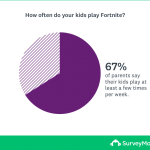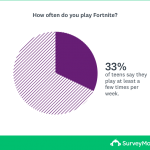Fortnite, the online video game that’s played by hundreds of millions of people worldwide, elicits nearly opposite opinions among teens and parents. Teens are more likely to see the positives from playing it, while parents tend to focus on the negatives.
We partnered with Common Sense Media to survey more than a 1,000 teenagers (13-17 years old), and over 2,000 parents (who have kids between the ages of 8-17 years old) to better understand their impressions of the game and to see how they feel about its use.
Here are some key data points from our Fortnite study:
- 61% of teens have played Fortnite.
- 55% of parents have spent money on Fortnite.
- 41% of parents say it’s at least slightly difficult to get their child to stop playing Fortnite and move on to another activity.
- 36% of parents say the game affects their child’s sleep (at least to some degree).
Now let's take a closer look at what we’ve learned:
How much people play Fortnite and where they play it
Our Fortnite study reveals that most parents think their kids play the game often:

Meanwhile, roughly one in three teens claim to play it at least a few times per week:

It isn’t a coincidence that many teens play the game so consistently: Fortnite uses design elements that experts believe keep players hooked.
With that being said, can kids resist playing it when they need to be focusing on other things?
Just 2% of parents believe that their child plays Fortnite during class. But, as you might suspect, they’re being optimistic. More than a quarter of teens (27%) admit to doing so.
The platforms people use to play Fortnite can vary, which can in turn have an effect on where they play.
But here’s what teens told us:
Parents seem to underestimate the game’s adoption on smartphones and on laptop/desktop computers: platforms that allow kids to play when they’re away from home.
Is Fortnite bad for you? It depends who you ask
Nearly half of parents from our Fortnite study are at least slightly concerned about the amount of time their kids spend playing the game.
When teens were asked, “Is Fortnite bad for you?” the majority said no. About 1 in 7 are slightly (or more) concerned about how much they play Fortnite.
One big reason for parent’s concern might have to do with the violent nature of the game. Roughly 70% said they were at least slightly concerned about its level of violence, while only 17% of teens agreed that this warranted at any cause for concern.
Instances of harassment and inappropriate language during chats with others in the game may also be driving a wedge between parents’ and teens’ views. 30% of parents believe their child is frequently a victim of harassment or offensive language while playing, but only 9% of teens say they consistently experience this sort of inappropriate behavior.
Similarly, when it comes to the benefits from playing, teens are much less skeptical than their parents. From bonding with siblings to improving communications skills, teens were more likely to select every benefit we offered than their parents.
For teens:
And for parents:
When you take each groups’ views as a whole, it becomes easy to understand why only 39% of parents, versus 59% of teens, think that kids who are 11 years old or younger should play.
There’s little that parents and teens see eye-to-eye on when it comes to Fortnite. With the game only increasing in popularity, it will be interesting to see how each groups’ views change over time.
Methodology: This SurveyMonkey online poll was conducted from October 8-17, 2018. It collected responses from 2,111 parents with children between 8 and 17 years old, and from 1,348 teenagers, ages 13 to 17. Respondents for this survey were selected from the more than 2 million people who take surveys on the SurveyMonkey platform each day. Finally, the sample was balanced by age, gender, among other demographics, according to the U.S. Census.



